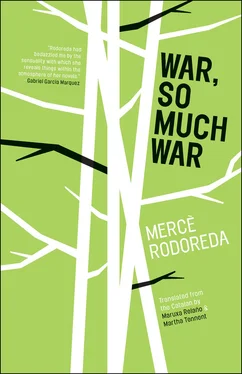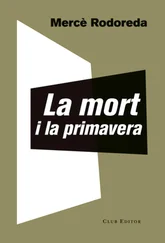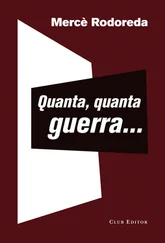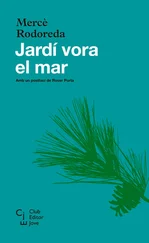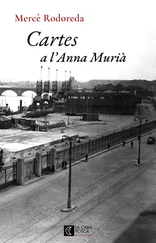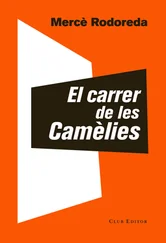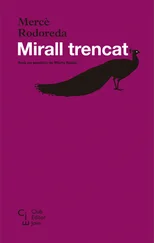There was music. Young men and girls arrived in wagons, trucks, and carts. I moved farther up the tree and straddled a branch that, although thick, creaked as though it were about to break. The young people climbed down from the vehicles and started dancing and jumping around the threshing floor. Shortly thereafter, trucks filled with militiamen appeared, one of them loaded with rifles and machine guns. The last to arrive was a truck festooned with white flowers, and from it descended the bride and groom, both in militia attire. She wore a white flower in her hair. Long live the bride and groom! Viva the bride and groom! The guests surrounded them shouting long live the bride and groom. The bride, short and stout, laughed continuously, and the groom, tall and thin, pushing aside those who got too close, kept saying: enough, enough. . Everyone began to take their places at the table. More cries were heard — the parents! The parents! An elderly couple descended from a cart pulled by a palomino. The mother wore a mantilla, the father a black hat. The parents are here! The parents are here! The groom’s parents! The girls who had set the table brought out porrons of wine. Viva the groom’s parents! Soon, women bearing food emerged from the farmhouse and placed on the table platters stacked high with slices of cured sausage, different varieties of ham, mounds of shelled prawns, open muscles with pink sauce, clams drowned in green sauce, and lobster tails garnished with mayonnaise. Two brawny men appeared with bowls of salad — lettuce and tomato with green and black olives — and plates piled with roasted eggplant and red peppers. Everyone talked and laughed, everyone was happy, everyone was hungry, everyone raised porrons and glasses, shouting over and over, long live the bride and groom, so there would be no end to the couple’s happiness or the Perarnau family name. A few young men rose from their chairs, approached the bride, and kissed her on both cheeks. A place at the head of the table remained empty, but everyone ignored it until the bride pointed to it and the two brawny men glanced at each other, sprang up and made for the house. The dinner guests turned their heads to see what was happening. The two men soon reappeared with a lardy man, round as a full moon, holding him by the arms to help him walk. The man, ruddy-faced, with close-set eyebrows, was wearing corduroy trousers that were so wide they resembled a skirt. And espadrilles with black ribbon ties. Arms aloft, he cried: I haven’t eaten for more than two hours, I’m hungry and weak. He walked without being able to see his feet or where he placed them, so large was his paunch. When he reached the well, he stopped to catch his breath and the girls cropped up like two little devils and hurled a worm at his head. Scoundrels! Scoundrels! And he started weeping, saying he was scared to walk because his brothers were unthinking brutes who would let him trip on a stone, and that would be the end of him. There are no stones, there are no stones, said one of the brothers; the other lost his patience and shouted, walk, you fool, walk! I swear there are no stones in your way. Come here, Uncle, come here, shouted the bride, holding up a fork with a prawn speared on it. We want Manel over here! A man as burly as the two escorting the moon-shaped man stepped toward the brothers. Mind the stones! Whenever they take him out for some fresh air, he’s afraid of tripping — said a girl holding a glass of blood-red wine to her mouth — and falling flat on his round belly, and rolling and rolling, with those short little arms and legs of his. The moon-shaped man lowered his head. They plopped him down in his assigned spot, on two chairs that had been pushed together, the backrests and crosspieces held together with wires. A bowl of hors d’oeuvres and another with salad and roasted red peppers was set before him. Women and girls kept removing the empty dishes and returning with food-laden platters. And then it was time for the chicken and the grilled meat, the partridge and the quail. The moon-shaped man, who had eyes only for the food he was ingesting, ate the hors d’oeuvres and salad, followed by two plates of rice with hunks of pork and rabbit legs, two monkfish, two hakes, two chickens stuffed with pears and prunes, half a veal round, three partridges, and two squabs. . a platter of sweets, a ring cake, three dishes of crema catalana and who knows how many flans. After coffee was served, the dance began on the threshing floor. While everyone was dancing, the bride and groom climbed in the truck with the rifles and machine guns and drove away, raising a cloud of dust. When the guests who were dancing realized, they began to reprimand the couple: That’s not fair! You cheats! A girl with a red skirt and a red flower in her hair shouted until she was hoarse, Viva the bride and groom! Viva! as she twirled a bunch of colorful ribbons against the paling sun.
One of my legs ached and I changed positions. The branch groaned. The moon-shaped man glanced up, searching among the leaves. When he spotted me, he seemed fascinated by what he saw, and he raised his arm and motioned for me to come down. He had me sit beside him and asked me to get him a glass of water and sugar; he couldn’t reach the pitcher, much less the sugar bowl. Lunch has made me thirsty. As he gulped down the water, he kept looking at me with pitiful eyes. He told me to eat, he said I looked hungry. I stuffed myself with sweets, with cake, with a bit of crème brûlée that someone hadn’t finished.
Here you have me, a man consumed by a never-ending urge to eat. The men who were holding me by the arms are my brothers: the middle one and the youngest. They are waiting for me to die, claws at the ready. I used to eat like a bird, I had no appetite, my growth was stunted. My mother was always preparing delicacies for me. . here, have some chicken livers, have some lamb brains, have some hen combs, have some rabbit cheeks. All light fare, which I scarcely ever touched. I was scrawny. All skin and bones, arms like matchsticks, legs like matchsticks. Until someone told my mother to feed me honey. I had never tasted it before, and I liked it so much that all day long I would cry for more. I kept pots of it beside my bed and spent my nights dipping fingers into it, licking away. And, being small of frame, I slowly developed a considerable layer of fat. This change went hand in hand with my brothers’ glee as I turned into a ball of lard and they saw how any little effort left me winded. In the end they deemed me worthless, even though I had married and produced a son (everybody shouted Miracle! because no one could understand how I had managed to make the boy). My wife and son soon died, and my brothers cast me aside and managed the property without offering me any explanations, although I was the heir. I have seven months to live; my heart has a casing of fat that is slowly choking it. Suddenly, he ordered me to climb back up the tree because his brothers were coming for him and they would scold him if they saw him talking to a stranger.
The two men took him back to the house the same way they had helped him to the table: holding him by the arms and prodding him occasionally from behind. The dancers had left and everything lay enveloped in the shadows of dusk. As I climbed down from the tree I scared off a clutch of sparrows that were pecking at the bread crumbs around the table. The dogs were eating by the portal; this time they didn’t chase after me, perhaps because after seeing me talking to the moon-shaped man they counted me as one of their own.
I raised my head, baa. . baa. . baa. . those sheep cries intrigued me; I had to see for myself what was happening. Behind the farmhouse, near the vegetable garden, three stout men were shearing sheep. The animals had wide foreheads, pointy muzzles, droopy ears, and legs so covered in wool that you could scarcely see them. The men had rough faces. One of them, with white hair and a deeply furrowed brow, immediately spotted me. When I realized he had seen me I made an attempt to flee, which spoiled everything because then the younger one, in a fleece vest, grabbed me by the arm and shoved me to the ground. I kicked him. But he was the stronger of the two. He dragged me to where the sheep were being sheared and, amid shouts and panting, they pinned me down by the arms and legs and started running the shears over my head.
Читать дальше
